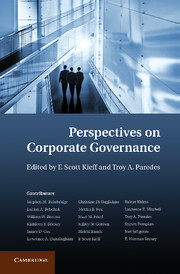Book contents
- Frontmatter
- Contents
- Contributors
- Acknowledgments and Dedication
- PERSPECTIVES ON CORPORATE GOVERNANCE
- Introduction
- PART ONE THE BOARD OF DIRECTORS AND THE CEO
- 1 The Trouble with Boards
- 2 Rediscovering Board Expertise: Legal Implications of the Empirical Literature
- 3 The CEO and the Board: On CEO Overconfidence and Institutionalizing Dissent in Firms
- PART TWO THE WHY, WHEN, HOW, AND HOW MUCH OF EXECUTIVE PAY
- PART THREE CONSTRAINING MANAGERS AND DIRECTORS: INVESTORS, SECURITIES REGULATION, AND THE MEDIA
- PART FOUR DELAWARE VERSUS CONGRESS: ON THE FEDERALIZATION OF CORPORATE GOVERNANCE
- PART FIVE COMPARATIVE CORPORATE GOVERNANCE
- Epilogue: Three Secular Trends of Corporate Law
- Index
- References
3 - The CEO and the Board: On CEO Overconfidence and Institutionalizing Dissent in Firms
Published online by Cambridge University Press: 04 August 2010
- Frontmatter
- Contents
- Contributors
- Acknowledgments and Dedication
- PERSPECTIVES ON CORPORATE GOVERNANCE
- Introduction
- PART ONE THE BOARD OF DIRECTORS AND THE CEO
- 1 The Trouble with Boards
- 2 Rediscovering Board Expertise: Legal Implications of the Empirical Literature
- 3 The CEO and the Board: On CEO Overconfidence and Institutionalizing Dissent in Firms
- PART TWO THE WHY, WHEN, HOW, AND HOW MUCH OF EXECUTIVE PAY
- PART THREE CONSTRAINING MANAGERS AND DIRECTORS: INVESTORS, SECURITIES REGULATION, AND THE MEDIA
- PART FOUR DELAWARE VERSUS CONGRESS: ON THE FEDERALIZATION OF CORPORATE GOVERNANCE
- PART FIVE COMPARATIVE CORPORATE GOVERNANCE
- Epilogue: Three Secular Trends of Corporate Law
- Index
- References
Summary
INTRODUCTION
In describing the “effective executive,” Peter Drucker said:
Unless one has considered alternatives, one has a closed mind.
This, above all, explains why effective decision makers deliberately disregard the second major command of the textbooks on decision making and create dissension and disagreement, rather than consensus.
Decisions of the kind the executive has to make are not made well by acclamation. They are made well only if based on the clash of conflicting views, the dialogue between different points of view, the choice between different judgments. The first rule in decision-making is that one does not make a decision unless there is disagreement.
He continued:
The effective decision-maker … organizes disagreement. This protects him against being taken in by the plausible but false or incomplete. It gives him the alternatives so that he can choose and make a decision, but also so that he is not lost in the fog when his decision proves deficient or wrong in execution. And it forces the imagination – his own and that of his associates. Disagreement converts the plausible into the right and the right into the good decision.
Managing a company as CEO is about making decisions. Making decisions is not the hard part. The hard part, as Drucker suggests, is making good decisions and then implementing them successfully.
Without question, chief executives make astute, effective decisions routinely but not always. Lots of possibilities explain why bad decisions get made and why even good decisions get implemented poorly.
- Type
- Chapter
- Information
- Perspectives on Corporate Governance , pp. 96 - 114Publisher: Cambridge University PressPrint publication year: 2010
References
- 2
- Cited by



